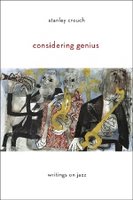
Considering Genius: Writings on Jazz
By Stanley Crouch
Basic Books/Civitas
0-465-001517-4
Given Stanley Crouch’s take-no-prisoners reputation, reviewing his latest book is a little intimidating, but his newest collection of essays offers readers plenty to sink their teeth into. Considering Genius: Writings on Jazz features Crouch’s passion, wit, and scholarship, providing entertaining insights into many of the great figures of jazz history. Crouch is not about to write Considering Mediocrity, after all.
Crouch may well be one of the most stylistically influential jazz writers. He often writes elaborately lofty passages, and then hits the reader over the head with something heavy. Often this brings an affectionate smile, as when discussing Louis Armstrong late in his career, Crouch writes: “as long as a lion has teeth and claws, it isn’t safe to stick an arm in his cage.” (p. 77) Other times it can make one wince, as when critiquing the music recorded for Clint Eastwood’s Bird, Crouch bluntly states: “the drummer, John Guerin, does not swing.” (p. 69) Period, end of paragraph.
Crouch takes jazz seriously, and he does not have the time or inclination to mince words. Throughout the jazz writings collected here, Crouch defends the seemingly irrefutable proposition that jazz was a unique creation of African-Americans, and must be considered in that context. However Crouch refuses to reduce jazz to an expression of victim-hood, arguing: “it is a dangerous simplification to hear jazz primarily as a music protesting the social conditions of Afro-Americans,” later arguing “If social problems in and of themselves were the only things that provoke the creation of great art, a century as bloody as ours would have inspired far more original and profound aesthetic achievements than it has.” (p. 179) For those who insist on interpreting jazz as a music of victimization, if you take away the suffering, you would also take away the art, and Crouch will have none of that.
Crouch disregards sacred cows when it comes to writing about music and race, which led to his being spectacularly fired as a columnist for Jazz Times. When Crouch took critics to task for championing the white “downtown” experimental trumpeter Dave Douglas over more swing oriented African-American players, it created a hue and cry heard far outside the jazz press. In fact, Douglas got off easy in the provocatively titled column “Putting the White Man in Charge” when the normally sharp-penned Crouch allowed Douglas “is far from being a bad musician, but he knows he should keep as much distance as possible between himself and trumpet players like Walace Roney, Terence Blanchard, and Nicholas Payton.” (p. 233-234)
Crouch proceeded to praise white players like Joe Lovano, and in a later column, Brad Mehldau and Bill Charlap, but to his detractors, Crouch was the Bull Connor of “Crow Jim,” the alleged discrimination against white players in jazz. Rather than be delighted to have printed something that actually generated discussion, Jazz Times purged Crouch, the most recognizable jazz critic, perhaps ever, thanks to his on-screen commentary on Ken Burns’ Jazz and Jack Johnson documentaries.
It was actually a controversy more about style, than race, but it was sufficient to end Crouch’s column. Many of Crouch’s rhetorical battles are fought over the boundaries of jazz, which he often sets as encompassing: “the blues, four/four swing (fast/medium/slow), the ballad, and the AfroHispanic or “Latin” rhythm” (p. 221) Often left out are fusion and the so-called avant-garde, although both Ornette Coleman and Sun Ra are profiled in complimentary terms.
Crouch writes with a passion for jazz, because he believes it is important. “Blues to Be Constitutional” makes an extended comparison between jazz and the U.S. Constitution, arguing:
“Just as American democracy, however periodically flawed in intent and realization, is a political, cultural, economic, and social rejection of the automated limitations of class and caste, jazz is an art in which improvisation declares an aesthetic rejection of the preconceptions that stifle individual and collective invention.” (p. 176)
Rather than simply rewrite record label press releases, Crouch defends a vision of jazz based in swing and the blues, and not beholden to notions of innovation for innovation’s own sake. Although I would suggest Crouch is missing out on some of the artists he dismisses, (like Don Byron, at least on his more swinging CDs like Bug Music and Ivey-Divey), he has a legitimate point of view based on an intimate knowledge of the music. Unlike many jazz books, Considering Genius will probably have wide readership outside the immediate music circles, due to Crouch’s PBS celebrity and syndicated Daily News column. What they will find is passionate writing befitting a great music, and the American nation which produced it.